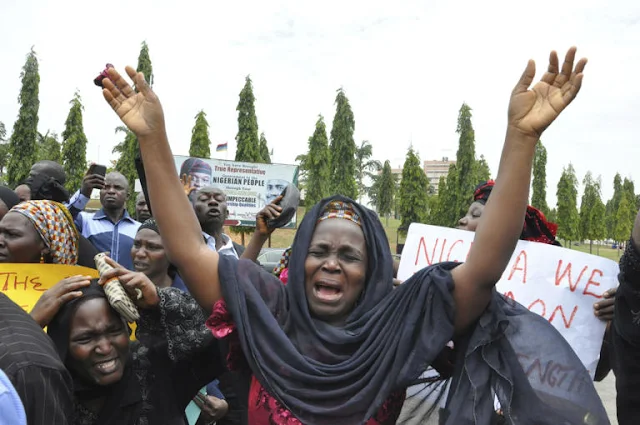ABUJA, Nigeria (AP) — Lawan Zanna, 55, reflects on his daughter, Aisha, in his daily prayers. She was one of the 276 schoolgirls abducted a decade ago when Islamic extremists attacked their school in Chibok village in northeastern Nigeria.
"It angers me to talk about it," Zanna said.
His daughter is among the nearly 100 girls still missing after the 2014 kidnappings that shocked the world and led to the global #BringBackOurGirls social media campaign.
The Chibok abduction was a watershed moment as the first major school kidnapping in Nigeria. Since then, over 1,400 students have been abducted, particularly in the conflict-ridden northwest and central regions. Most hostages were released only after ransom payments or government-brokered agreements, with the perpetrators rarely facing arrest.
This year marks the 10th anniversary of the largely overlooked tragedy.
To commemorate, members of Borno state's Chibok community gathered in Nigeria’s economic hub, Lagos, to attend the screening of "Statues Also Breathe," a collaborative film by French artist Prune Nourry and Nigeria’s Obafemi Awolowo University.
The film aims to raise awareness about the missing girls while highlighting the global struggle for girls’ education.
The 17-minute film features 108 sculptures, representing the number of girls still missing when the project began.
The sculptures attempt to recreate the girls' current appearances using pictures provided by their families, capturing everything from their facial expressions to hairstyles and visible patterns.
The film also documents the emotional toll on families, including heartbroken mothers reminiscing about life with their daughters at home. One mother recalls how her daughter, Aisha, used to adorn her hair with henna and other decorations during Ramadan. But Aisha hasn't been home in a decade.
Nigerian authorities' efforts to free the remaining captives have been criticized. Chioma Agwuegbo, an activist from the #BringBackOurGirls campaign, says the government has failed to adequately care for the freed women and children.
Analysts are concerned that security lapses leading to the Chibok abduction remain in place in many schools.
A recent survey by the UN children’s agency in Nigeria found that over 6,000 surveyed schools meet only 43% of minimum safety standards.
Nnamdi Obasi of the International Crisis Group says security and safety arrangements in schools are often weak or non-existent, with military and police personnel insufficient and stretched thin.
Authorities provide few updates on efforts to free the Chibok women, but some freed captives have reported that those still missing have been forcibly married to the extremists. About a dozen Chibok women have escaped since early 2022, all returning with children.
"I think we shouldn’t even think about them anymore," one Chibok mother said in the film. "I feel like they are already gone."
__
Follow AP’s Africa coverage at: [AP Africa](https://apnews.com/hub/africa)

